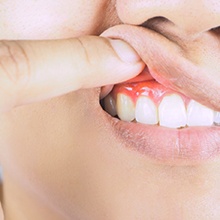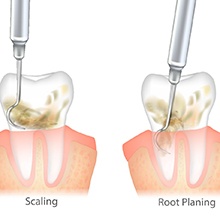

Our goal is to help you enjoy a healthy smile for the rest of your life, and one of the ways we’re able to do that is by keeping an eye out for some of the most common oral health problems, like gum disease in Virginia Beach. We aim to spot, diagnose, and treat this issue before it has a chance to cause permanent damage to your smile with scaling and root planing and antibiotic treatment. You can learn more about this oral condition, as well as how we address it, by reading below. If you notice some of the symptoms of gum disease, please call our office to schedule an examination.

Periodontal disease, also known as gum disease, is an oral infection that’s caused by bacteria that accumulate along the gumline and in the pockets of the gums around the teeth. In its early stages, called gingivitis, gum disease causes relatively minor symptoms like chronic bad breath or bleeding gums, but when left untreated, the infection can progress into periodontitis. Periodontitis is known as the number one cause of tooth loss, leading to the deterioration of the supportive bone and gum tissue that help hold your teeth in place.
At Smile by Design of Virginia Beach, our top priority is to spot the early signs of gum disease and provide you with treatment to prevent your symptoms from becoming more extensive.

Common symptoms of the condition include:
If these sound familiar, please call our Virginia Beach practice today so that we can schedule you in for an expert evaluation. And remember – even if you aren’t exhibiting any of the symptoms, periodontal disease can sometimes remain invisible until it begins to cause permanent damage. Attend regular check-ups at Smile by Design of Virginia Beach so that we can keep an eye on your gums and make sure your smile stays in tip-top shape.

We’ll examine your gums at each of your checkups to see if you’re experiencing any signs of gum disease. If we determine it’s necessary, we will recommend one or both of the treatment options below to help stop or even reverse the infection:

Scaling and root planing is one of the most effective ways to treat periodontal disease before it becomes too severe. This method includes a deep, thorough cleaning between the gum and the teeth, all the way down to the roots, and it’s typically completed in two appointments. It’s crucial to follow up the treatment with a diligent brushing and flossing routine; without proper dental care, gum disease can begin to progress again.

Scaling and root planing is often referred to as a “deep cleaning.” If we notice any signs of gum disease, like bleeding, swelling, or inflammation, we will address it as quickly as we can to prevent it from progressing further and resulting in permanent damage to your smile. This treatment aims to remove bacteria built up around and beneath the gumline. During the root planing portion of the treatment, the roots are smoothed down to allow your gums to reattach to the teeth.

Scaling and root planing normally take place over two appointments. The first one consists of the “scaling” part of the process. During this visit, we will scrape away the plaque and tartar that have formed along and beneath the gumline using dental instruments.
Once the scaling portion is complete, we will move on to the root planing. We will do this by smoothing sections of the teeth that are normally hidden beneath the gum tissue. This allows the gums to adhere to your teeth more easily, making it more challenging for bacteria to accumulate again. This will reduce your risk of developing gum disease again later on.

Some soreness of the gum tissue is to be expected after undergoing scaling and root planing. You might also have some minor inflammation in the affected area. This is temporary and should resolve itself after a few weeks. Here are some tips to help you recover quickly:

In addition to scaling and root planing, we can also prescribe you with periodontal medication, such as Arestin, Oraqix, or Peridex. These are all available to you as substances you can use alongside good oral hygiene and regular periodontal check-ups in order to bolster your health and prevent reinfection from occurring.